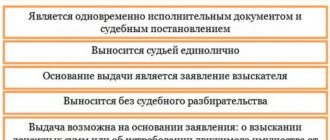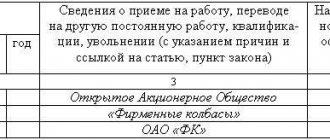- Specifics of writ proceedings
- Procedure for filing an application for a court order
- Jurisdiction of an application for a court order
- State fee for filing an application for a court order
- What judicial acts are issued in writ proceedings?
- For what requirements is a court order issued under the Code of Civil Procedure of the Russian Federation, the CAS of the Russian Federation and the Arbitration Procedure Code of the Russian Federation (nature and types of requirements)
- The maximum amount of recovery by court order under the Code of Civil Procedure of the Russian Federation, CAS RF, Arbitration Procedure Code of the Russian Federation
- Deadline for issuing a court order
- Return of an application for a court order and refusal to accept a court order
- What procedural rules are not applicable in writ proceedings?
- Advantages of writ proceedings
Writ proceedings, as an independent institution, were created for the quick and effective consideration of categories of court cases that do not have a dispute about the law in civil, administrative and arbitration proceedings of the Russian Federation.
In other words, this is a type of consideration of cases in a simplified manner, without a trial, as a result of which, based on the claimant’s application, the judge alone issues a court order, called a court order.
Separate chapters are devoted to writ proceedings in the Civil Procedure Code of the Russian Federation (Chapter 11), the Code of Administrative Proceedings of the Russian Federation (Chapter 11.1), and the Arbitration Procedure Code of the Russian Federation (Chapter 29.1).
At the same time, the courts in their law enforcement practice take into account the explanations contained in the resolutions of the Plenum of the Supreme Court of the Russian Federation on the application of substantive and procedural legal norms to be applied in the case (Resolution of the Plenum of the Supreme Court of the Russian Federation dated December 19, 2003 No. 23 (as amended on June 23 .2015) “On the court decision”).
Explanations regarding the application by courts of the rules of the law dedicated to writ proceedings are contained in the Resolution of the Plenum of the Supreme Court of the Russian Federation dated December 27, 2016 No. 62, Resolution of the Plenum of the Supreme Court of the Russian Federation dated September 27, 2016 No. 36 (as amended on July 9, 2020).
After the entry into force of Federal Law No. 451-FZ of November 28, 2018, which introduced significant amendments to the Code of Civil Procedure of the Russian Federation, the Arbitration Procedure Code of the Russian Federation and the CAS of the Russian Federation, the procedural procedure for considering applications for a court order established by this Federal Law is subject to application, including applications submitted before its entry into force (Resolution of the Plenum of the Supreme Court of the Russian Federation dated 07/09/2019 No. 26).
Accordingly, the explanations contained in previously issued Resolutions of the Plenum of the RF Armed Forces regarding the application of procedural norms in the previous edition (before the amendments made by Federal Law No. 451-FZ) cannot be taken into account by judges when resolving relevant issues arising in the course of civil, administrative and arbitration proceedings.
Legal assistance in obtaining a court order. Tel.+7 (812) 989-47-47 Telephone consultation
Specifics of writ proceedings
The specificity of writ proceedings is that the judge issues a judicial act solely on the basis of the documents presented by the claimant, which, in turn, must confirm the existence of the debtor’s obligation to the claimant, the indisputability of the claim and the fact of the debtor’s failure to fulfill this obligation.
An important feature of writ proceedings is that the application is considered:
- Single judge
- No trial
- Without calling the parties
As a distinctive feature of a court order, one can note its equivalence to a writ of execution, that is, a court order has the force of a writ of execution (part 2 of article 121 of the Code of Civil Procedure of the Russian Federation, part 3 of article 123.1 of the Code of Arbitration Procedures of the Russian Federation, part 2 of article 229.1 of the Arbitration Procedure Code of the Russian Federation).
A court order that has entered into legal force is subject to the provisions of the law on the mandatory nature of judicial acts throughout the entire territory of the Russian Federation (part 1 of article 13 of the Code of Civil Procedure of the Russian Federation, part 1 of article 16 of the CAS RF, part 1 of article 16, part 1 of article 319 Arbitration Procedure Code of the Russian Federation), as a result of which failure to comply with a court order entails liability established by federal laws.
The court examines only the documents submitted by the claimant.
In writ proceedings, the possibility of the court examining a different range of evidence other than the primary documents submitted by the claimant is completely excluded.
During the consideration of an application for a court order, the judge is not entitled to :
- request additional evidence
- call witnesses, experts, specialists, translators for questioning (questioning)
- involve third parties in the case
- call the parties and listen to their arguments
The indisputability of the claimant's claim in writ proceedings.
In legal proceedings for the issuance of a court order, the absence of a dispute regarding the claims stated by the claimant is presumed.
The indisputability of the claimant's claim is the condition under which a court case is subject to resolution on the merits by issuing a court order.
The indisputability of the claimant's claim must be confirmed by reliable written evidence recognized by the debtor.
It should be noted that in connection with the amendments made to Article 229.2 of the Arbitration Procedure Code of the Russian Federation by Federal Law No. 451-FZ of November 28, 2018, from October 1, 2019, when filing an application for a court order to the arbitration court, the claimant is not required to confirm the recognition and non-fulfillment debtor of his obligations . It is enough to present to the court documents establishing the debtor’s financial obligations.
If the documents reveal the debtor’s disagreement with the stated requirements, then the judge, having established the existence of a dispute about the right, issues a ruling to refuse to accept the application for the issuance of a court order (clause 3, part 3, article 125 of the Code of Civil Procedure of the Russian Federation, clause 3, part 3 Article 123.4 CAS RF, clause 3, part 3, Article 229.4 of the Arbitration Procedure Code of the Russian Federation).
In arbitration and administrative processes, the receipt of written objections from the debtor regarding the claims made against him before the issuance of a court order may also indicate the existence of a dispute.
Meanwhile, in civil proceedings, the debtor has the opportunity to apply for the cancellation of a court order only after it is issued.
The fact is that in arbitration and administrative proceedings the claimant is obligated by law to send or hand over to the debtor a copy of the application for the issuance of a court order with attachments before filing it with the court (part 4 of article 229.3 of the Arbitration Procedure Code of the Russian Federation and part 3 of article 123.3 of the CAS RF). This allows the debtor to state his disagreement with the demand presented to him before the court order is issued, which, in turn, allows the judge to refuse to accept the application for the issuance of a court order due to the contentiousness of the stated demand.
Unfortunately, the Civil Procedure Code of the Russian Federation does not provide for such additional guarantees of observance of the debtor’s rights in writ proceedings, therefore, the debtor learns about the issuance of a court order upon receiving a copy of this judicial act, after which he has 10 days at his disposal, during which he has the right to implement the law granted to him the possibility of filing objections to the court order, which, in turn, entails the cancellation of the court order by the judge who issued it.
Procedure for filing an application for a court order
When filing an application for a court order, strict adherence to the procedural rules established for this purpose by the relevant regulatory legal act is necessary.
Requirements for the form and content of such a statement are enshrined in the relevant norms of laws governing civil, administrative and arbitration proceedings:
- In articles 123, 124 of the Civil Procedure Code of the Russian Federation dated November 14, 2002 No. 138-FZ
- In articles 123.2, 123.3 of the Code of Administrative Proceedings of the Russian Federation dated 03/08/2015 No. 21-FZ
- In Article 229.3 of the Arbitration Procedure Code of the Russian Federation of the Arbitration Procedure Code of the Russian Federation dated February 24, 2002 No. 95-FZ
The mentioned norms set out in detail the form in which an application for a court order is submitted, what information and mandatory details it must contain, what circumstances must be confirmed by the claimant, and what documents must be attached to the application for a court order.
Read below about the procedural consequences of failure to comply with the requirements for the form and content of an application for a court order.
Appealing a debt collection order
The form of writ proceedings implies the absence of mutual claims between the two parties to the proceedings - the applicant and the defendant. The period for execution of a court order for debt collection begins to be calculated from the moment the debtor receives a registered letter containing a copy of the court order. The defendant, after serving the letter, has a ten-day period to appeal the judge's decision.
After filing a protest, the case cannot be considered again by order. The simplified regime provides for the absence of any disagreements between the lender and the debtor regarding the payment procedure and the amount of debt. When a case is reconsidered, it occurs exclusively in the “standard” claim form. In the latter case, the presence of the plaintiff and the debtor-borrower, or their official representatives, is required at the meeting.
This is important to know: The decision to collect funds from a gardening partnership
In the claim form of legal proceedings, both disputing parties present their position to the judge for consideration, defending it in all ways provided for by procedural standards. As evidence, it is possible to provide supporting documentation, witness statements, checks and receipts indicating partial repayment of the debt, etc. It should be remembered that filing an appeal automatically cancels the decision made by order. Accordingly, the deadline for executing a court order for debt collection loses its relevance.
Jurisdiction of an application for a court order
An application for the issuance of a court order is submitted to the magistrate according to the rules of paragraph 1 of part 1 of Art. 27 Code of Civil Procedure of the Russian Federation or Art. 17.1 CAS RF, depending on the subject composition of the participants and the nature of legal relations, in accordance with the rules of general territorial jurisdiction provided for by Chapter 3 of the Code of Civil Procedure of the Russian Federation and Chapter 2 of the CAS RF, respectively.
Applications for the issuance of a court order within the competence of the arbitration court are submitted to the arbitration court of the first instance taking into account the rules of jurisdiction established by Chapter 4 of the Arbitration Procedure Code of the Russian Federation.
It should be taken into account that in writ proceedings carried out within the framework of the Civil Procedure Code of the Russian Federation and the Arbitration Procedure Code of the Russian Federation, in addition to the rules of territorial jurisdiction, which provide for filing an application with the court at the address or place of residence of the defendant (Article 28 of the Code of Civil Procedure of the Russian Federation, Article 35 of the Arbitration Procedure Code of the Russian Federation), the rules also apply alternative and contractual jurisdiction (Articles 29,32 of the Code of Civil Procedure of the Russian Federation, Articles 36, 37 of the Arbitration Procedure Code of the Russian Federation) (clause 13 of the Resolution of the Plenum of the Supreme Court of the Russian Federation, set out in Resolution No. 62 of December 27, 2016 “On some issues of application by courts of the provisions of the Civil Procedure Code Russian Federation and the Arbitration Procedural Code of the Russian Federation on writ proceedings").
The territorial jurisdiction of such applications considered in administrative proceedings is determined in accordance with the general provisions of Part 3 of Art. 22 of the CAS of the Russian Federation, which provides for the jurisdiction of an administrative claim to the court at the place of residence of the citizen or at the location of the organization.
Duration of the court order
The debtor is obliged to pay the debt. If this does not happen, the creditor has the legal right to collect the debt through the courts. The review procedure takes from 2 months to 1 year.
This is important to know: Cancellation of a disciplinary sanction order: judicial practice
The basis is the victim’s statement for the return of money or things in case of claims:
- regarding a transaction certified by a notary;
- written agreement;
- notary to bills in non-payment, lack of acceptance date, non-acceptance;
- on child support payments (without taking into account interested parties);
- non-payment of wages, vacation pay and compensation upon dismissal;
- failure by the employer to comply with the terms of all payments provided for by law.
The speed of making a judicial decision depends on the form of the charge, the size and duration of the debt obligation and other nuances. The claim for compensation will not be reconsidered in court. The time of execution of the order to collect debt is analogous to the validity of the loan agreement.
Court orders are presented for execution within three years from the date of issue of the writ of execution.
In accordance with civil law, deadlines are defined for:
- settlement of controversial issues without judicial intervention;
- time to appeal to the defense in court;
- litigation;
- duration of action of bailiffs.
The legislation also considers the interests of the borrower who has become a debtor.
After receiving an order for debt compensation, you can try to improve the situation. To do this, you must contact the courts within 10 days with an objection in writing.
The time is counted from the moment of receipt of the notification, on which it is advisable to put a date, time and signature. According to Art. 129 of the Civil Code of the Russian Federation, an order can be canceled by a judge. The parties are notified within 3 days of the decision made.
State fee for filing an application for a court order
The amount of state duty payable when applying to court is established by the norms of the Tax Code of the Russian Federation.
When submitting an application for a court order to a magistrate, the claimant must pay a state fee in the amount of 50% of the amount of the state fee, which is payable when filing a claim of a property nature, an administrative claim of a property nature, subject to assessment (clause 2, clause 1, article 333.19 of the Tax Code RF).
A similar rule is contained in the norm stipulating the amount of state duty when filing an application for the issuance of a court order to an arbitration court (clause 4.1, clause 1, article 333.21 of the Tax Code of the Russian Federation).
First steps upon receipt of such a document
There are two options for behavior after receiving the document in hand.
- The first is to pay for the order . The document will necessarily indicate the amount of debt and bank account details for payment of funds.
- The second option is to challenge the court order . To do this, you need to submit your objections to the judge’s decision to the court within 10 days from the date of receipt of the order. This right is granted to citizens in accordance with the provisions of Art. 129 Code of Civil Procedure of the Russian Federation. Of course, these objections must be justified. If the defendant does not agree, the court order loses its legal force.
This is important to know: Claim for foreclosure on mortgaged property: judicial practice
What judicial acts are issued in writ proceedings?
When considering an application for the issuance of a court order , a magistrate or arbitration court has the right to perform one of three procedural actions , depending on the presence of certain grounds entailing corresponding procedural consequences.
Namely, the magistrate or arbitration court rules:
- Determination to return an application for a court order
- Ruling on refusal to accept an application for a court order
- Court order
Thus, a violation of the established procedural order committed by the claimant when filing an application for a court order entails one of two procedural consequences , depending on the nature of the violation - return of the application to the claimant, or refusal to accept it by the court.
Accordingly, if the claimant’s application in form and content fully complies with the requirements of the law, it is filed with the competent court in accordance with the general rules for delimiting the subject competence of the magistrate and the arbitration court, within the framework of the normative legal act that governs these legal relations, in compliance with the relevant rules of territorial jurisdiction, and is indisputable, then a procedural consequence in the form of issuing a court order. At the same time, the judge does not issue a separate ruling on accepting the application for his proceedings, since such an action is unnecessary.
Based on the above, other procedural rules applicable in claim proceedings, including rules on leaving an application without progress or without consideration, are not applied in writ proceedings.
It should be canceled that the application in writ proceedings by analogy of the procedural rules in force in the claim proceedings would lead to a violation of the very principle of simplification of the procedure for issuing a court order, since unnecessary procedural actions of the judge would significantly complicate this procedure.
Consultation with a lawyer on issues of issuing a court order. Tel.+7 (812) 989-47-47 Telephone consultation
Limit amount of recovery by court order
The size of claims that can be resolved by issuing a court order is limited by law (with the exception of applications for the issuance of a court order within the competence of the CAS of the Russian Federation).
The judge may issue a court order on the stated claim, provided that the total amount of the claim (the total amount of amounts presented for collection or the value of the claimed property) does not exceed the limits established by current legislation.
It should be noted that when determining the maximum amount of stated claims both the amount of the principal debt and accrued legal or contractual interest and penalties (penalties, fines) are taken into account
1. The maximum amount of recovery by court order under the Code of Civil Procedure of the Russian Federation
In court cases considered by magistrates within the framework of Chapter 11 of the Code of Civil Procedure of the Russian Federation, a court order is issued for monetary claims or claims for the recovery of movable property, if the amount presented for collection or the value of the claimed property does not exceed five hundred thousand (500,000) rubles.
2.The maximum amount of recovery under a court order according to the Arbitration Procedure Code of the Russian Federation
For applications considered by arbitration courts, a court order is issued:
- For monetary claims arising from non-fulfillment (improper execution) of the contract, as well as for a claim based on a protest of a bill of exchange made by a notary for non-payment, non-acceptance and undated acceptance - if the price of the claims does not exceed five hundred thousand (500,000) rubles (from 10/01/2019 )
- For requirements for the collection of mandatory payments and sanctions - if the total amount of the amount collected does not exceed one hundred thousand (100,000) rubles
3. The maximum amount of recovery by court order under the CAS RF
As part of administrative proceedings, the magistrate may issue a court order, regardless of the amount claimed for collection.
Unlike the Civil Procedure Code of the Russian Federation and the Arbitration Procedural Code of the Russian Federation, the norms of the Code of Administrative Proceedings of the Russian Federation do not contain restrictions on the amount of recovery in writ proceedings.
Article 17.1 of the CAS of the Russian Federation provides for the consideration by a magistrate of applications for the issuance of a court order on claims for the collection of obligatory payments and sanctions, without establishing a maximum amount of amounts collected by a court order. Chapter 11.1 of the CAS of the Russian Federation, dedicated to writ proceedings, does not contain anything about the limits of collection.
Consultation with a lawyer in civil cases. Tel.+7 (812) 989-47-47 Telephone consultation
Statute of limitations for a court order for debt collection
In domestic legal proceedings there is such a legal concept as limitation of actions. This term refers to the maximum period of time during which the injured party has the right to seek protection from the judiciary. As with all other legal proceedings, there is a statute of limitations for a court order to collect a debt. In the case of claiming borrowed money, this time period is three years.
It starts from the moment the borrower ceases to fulfill the debt service obligations assumed under the loan agreement. Accordingly, if in the 3 years that have passed from this moment the lender has not filed a claim with the justice authorities, then the court will no longer accept any claims regarding the return of the debt. In this case, neither the size of the unrepaid debt nor the form of the loan agreement play a role. The exception is debts resulting from non-payment:
- Alimony payments.
- Compensation payments for harm caused by the debtor to the health and life of a third party.
- Payments to the family of a person who died due to the fault of the debtor.
These types of debts have no statute of limitations and are subject to mandatory compensation regardless of the time that has passed since their formation. In some cases, the applicant has the right to claim restoration of the statute of limitations. This is possible if the lender was unable to file a claim on time as a result of circumstances beyond his control:
- Force majeure (natural disaster, fire, criminal act of third parties), as a result of which documentation confirming the existing debt was lost.
- A serious, long-term illness of the creditor, which did not allow him to draw up and submit a petition to the judicial authorities in a timely manner.
- Other factors that may be considered by the court as valid reasons.
In addition, the statute of limitations for a court order for debt collection can have 2 options: general and special. In the first case, it is standard and corresponds to 3 years. The special period can be adjusted by a court decision - reduced or extended depending on the circumstances.
If the order has already been issued, then it no longer has any statute of limitations - it is binding, even if 3 or 5, or even more years have passed since its issuance.
Return of an application for a court order and refusal to accept a court order
As mentioned above, violation of the rules for filing an application for a court order entails two procedural consequences , depending on the nature of the violations: return of the application for the issuance of a court order (when the violations can be eliminated) and refusal to accept the application for the issuance of a court order (when possible consideration of the claim in writ proceedings is generally excluded).
1. Return of an application for a court order and refusal to accept an application for a court order under the Code of Civil Procedure of the Russian Federation
An application for a court order must be returned to the claimant in cases where:
- The claimant did not confirm his demands with documents
- The application in form and content does not comply with the requirements imposed on it by Article 124 of the Code of Civil Procedure of the Russian Federation (mandatory details of the debtor, the claimant are not indicated; the name of the court is not indicated; the claims of the claimant and what they are based on are not indicated; the claimant did not attach documents in support validity of the claim; the list of appendices to the application is not indicated; the price of the claimed property is not indicated; the application is not signed by the claimant or his authorized representative, or the authority of the representative to sign the application is not confirmed)
- The claimant did not pay the state fee for filing an application with the court
To refuse to accept an application for a court order, the Civil Procedure Code of the Russian Federation establishes the following list of grounds, in the presence of which a court order cannot be issued:
- The claim made by the claimant does not fall under Art. 122 of the Code of Civil Procedure of the Russian Federation, which means the claim is subject to consideration in claim proceedings
- The debtor’s place of residence or location is outside the Russian Federation
- The court found that there was a dispute about the right
2.Return of an application for a court order and refusal to accept it in accordance with the CAS RF
Within the framework of the CAS of the Russian Federation, the magistrate returns the application for the issuance of a court order if:
- The applicant did not provide documentary evidence of his claims
- The provisions of Art. 123.3 CAS RF requirements for the form and content of the submitted application (the application does not contain the required details of the debtor, the collector, the court is not indicated; the application is not signed by the head of the control body on whose behalf it was submitted, or the powers of the person who signed the application are not confirmed; the direction of pre-trial demands to the debtor; the name of the collected payment, the size and calculation of the amount constituting the payment, the provision of the law providing for the payment of the obligatory payment, as well as the size and calculation of the amount of money constituting the sanction, the provision of the law providing for its application are not indicated; there is no documentary evidence of the validity of the stated requirements; there is no list of attachments to the application; no documentary evidence of sending or delivery to the debtor of a copy of the application with attachments has been provided; payment of the state duty has not been confirmed)
The magistrate refuses to accept an application for a court order in cases where:
- The claimant filed a claim not provided for by the norm of Part 3.1 of Art. 1 CAS RF
- The debtor’s place of residence or place of stay is outside the Russian Federation
- From the documents submitted by the claimant it follows that the claim is not indisputable
3. Return of the application for a court order and refusal to accept it in accordance with the Arbitration Procedure Code of the Russian Federation
The Arbitration Procedural Code of the Russian Federation establishes the following list of grounds for returning an application for a court order:
- The requirements for the form and content of the application have been violated (the obligatory details of the debtor, the claimant are not indicated; the claims of the claimant and the circumstances on which they are based are not indicated; documents substantiating the claim are not provided; the list of appendices to the application is not indicated)
- The case is not within the jurisdiction of this arbitration court
- The claimant did not provide documentary support for the claim
- The claimant's request for a deferment, installment plan or reduction of the state duty was rejected by the court
- The claimant requested the return of his application
- The application is not signed by the claimant or his representative, or the latter’s authority to sign the application is not confirmed
- State duty not paid
- There are no documents confirming the sending (delivery) to the debtor of a copy of the application for the issuance of a court order
The grounds for refusing to accept an application for a court order by an arbitration court are the following:
- The stated requirement does not fall within the scope of Art. 229.3 Arbitration Procedure Code of the Russian Federation
- The debtor’s place of residence or location is outside the Russian Federation
- The court found that there was a dispute about the right
Thus, violations of the procedural procedure for filing an application, which entail procedural consequences in the claim proceedings in the form of leaving the claim without progress, when considering the case in writ proceedings, give the judge grounds for returning the application to the claimant or for refusing to accept it.
Returning an application for a court order does not prevent the claimant from re-applying to the court after eliminating the violations. Refusal to accept an application for a court order is an obstacle to re-applying to the court with the same application.
Legal assistance to cancel a court order. Tel.+7 (812) 989-47-47 Telephone consultation
Application for initiation of writ proceedings
According to Article 124 of the Code of Civil Procedure of the Russian Federation it must be indicated:
- The name of the judicial authority to which the appeal is being made.
- Information about the creditor and debtor.
- Specific requirements for debt repayment.
- Mention of documents providing grounds for recovery.
- The value of the property (if the foreclosure is directed to it, and not to finances).
- List of attached documentation that must confirm the applicant’s requirements.
The application is signed by the claimant himself or a person authorized to do so. If the document is submitted by a legal representative, a copy of the passport must be attached. By law, a submitted application is considered within 5 days.
For an individual
The peculiarity of this type of application is that it must include:
- Last name, first name, patronymic of the person applying to the court.
- Date of his birth.
- Registration address.
- Contact information – phone and/or email.
Depending on the specific situation, you must attach:
- Collection of alimony – marriage certificate, child birth document.
- A transaction between citizens is the original contract. In cases provided for by law, it must be certified by a notary.
- Issuance of wages - a copy of the work record book, a certificate of unpaid funds (it must be signed by the head of the organization or the chief accountant).
- Contesting a bill is a copy of this security.
- Diet of ballerinas
- Blisters on fingers
- Sponge roll: recipes
Collection of credit debt by a bank
If the loan is overdue for more than two months, the financial institution can apply to the court for an order to collect the debt.
The application must include:
- Full name of the credit institution.
- License number.
- Legal and actual address, contact numbers, last name, first name and patronymic of the responsible person.
- Details of the loan agreement.
- Information about credit conditions and the amount of debt.
- Last name, first name, patronymic of the debtor, his registered address and contact phone number.
What procedural rules are not applicable in writ proceedings?
As noted above, the magistrate or arbitration court examines the application for a court order and the attached documents for compliance with the established procedural rules, and if relevant violations are identified, returns the application to the recoverer or refuses to accept it, and in the absence of procedural violations, resolves the case on the merits by issuance of a court order. The law does not provide for the application of other procedural rules in writ proceedings.
- An application for the issuance of a court order cannot be left without consideration by the court.
- The judge does not have the right to make a ruling to refuse to issue a court order
- Order proceedings cannot be terminated
- The judge cannot take interim measures in the case
- Writ proceedings exclude the possibility of filing counterclaims against the claimant and their acceptance by the court
- In writ proceedings there is no stage of preparing the case for trial
- In writ proceedings, procedural rules governing the stage of the trial are not applied.
- The case regarding the issuance of a court order cannot be completed by reconciliation of the parties; any conciliation procedures are not applicable in writ proceedings
It should be noted that the prohibition on the use in writ proceedings of the above-mentioned norms in force in claim proceedings is enshrined in the imperative norm of Part 7 of Art. 229.5 of the Arbitration Procedure Code of the Russian Federation, and taking into account the explanations contained in the Resolution of the Plenum of the Supreme Court of the Russian Federation of December 27, 2021 No. 62, this norm is subject to application by analogy in writ proceedings carried out during civil proceedings (Part 4 of Article 1 of the Code of Civil Procedure of the Russian Federation). If issues arise during writ proceedings that are not directly regulated by the norms of the CAS RF, magistrates also have the right to apply the appropriate norm by analogy with the law to resolve them (part 4 of article 2 of the CAS RF).










